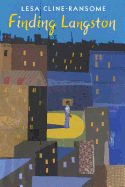
After 11-year-old Langston's mother died, he and his father packed up their few belongings and headed north, hoping, as his daddy said, for a "chance for something better." Langston's new home in post-World War II Chicago's "Black Belt" is nothing like his old home in rural Alabama, and Langston's junior high is filled with kids who call him "country boy" and laugh at the overalls and "run-over" shoes he wears. But, like it or not, Chicago is home now. Langston aches for his mama and feels that he barely even knows his now-quiet father.
It's not until Langston stumbles upon the neighborhood library when trying to get away from bullying boys that he finds a refuge--both in the cool, airy building and in the poems of a poet he discovers. Not only does the poet--Langston Hughes--share his first name, but when Langston reads Hughes's poems, it "[f]eels like reading words from [his own] heart." As he devours Hughes's poems, he begins to find his own voice, finally opening up to his daddy about why he loves reading, and this poet in particular: "[H]e writes poems about being a Negro and living up north but missing the South and feeling lonely."
Lesa Cline-Ransome has written many picture books (Before She Was Harriet; Freedom's School) but the winsome Finding Langston is her first novel. Here, she explores the midpoint of what is known as the Great Migration, a 50-year period when more than seven million black people left the South "in search of a better life in the North," expanding Chicago's black population from 2% to 33%. Finding Langston is about cultural heritage and personal growth and, at its heart, about finding home wherever you land. --Emilie Coulter, freelance writer and editor

